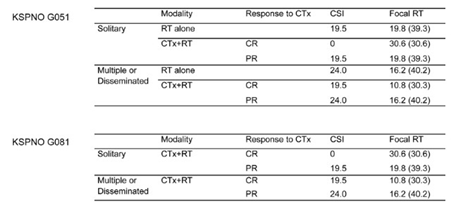글로벌 연구동향
방사선종양학
- 2019년 11월호
[Radiother Oncol.] Upfront chemotherapy followed by response adaptive radiotherapy for intracranial germinoma: Prospective multicenter cohort study.연세의대 / 이동수, 서창옥*, 김동석*
- 출처
- Radiother Oncol.
- 등재일
- 2019 Sep
- 저널이슈번호
- 138:180-186. doi: 10.1016/j.radonc.2019.06.002. Epub 2019 Jul 15.
- 내용
Abstract
PURPOSE:
To assess the efficacy of upfront chemotherapy followed by response-adapted reduced-dose/reduced-volume radiotherapy (RT) for intracranial germinoma.MATERIALS AND METHODS:
Ninety-one patients from five institutions were registered in the KSPNO G051/G081 Protocol. Germinomas were classified as solitary or multiple/disseminated diseases, and upfront chemotherapy was administered. For all patients with multiple or disseminated disease, and patients with partial response after chemotherapy, 19.5-24 Gy of craniospinal irradiation plus 10.8-19.8 Gy of tumor bed boost were planned. For patients with complete response (CR), reduced-dose RT (30.6 Gy) was planned, along with a reduced field for solitary lesions.
RESULTS:
The median patient age was 14 (range, 3-30) years. Sixty-five patients (71.4%) had a solitary lesion. The median follow-up duration was 67.9 (range, 6.6-119.3) months. Recurrence was not observed in 32 patients in the protocol compliant group. Four patients (4.4%) in the protocol non-compliant group experienced relapse after CR and one patient died of the disease. The 5-year and 7-year overall survival rates were 98.8% and 98.8%, while the corresponding event-free survival rates were 96.6% and 93.8%, respectively. All three patients with basal ganglia germinomas who were treated with local RT experienced recurrence outside the RT field. Among the 23 patients with pineal or suprasellar lesions who received whole-ventricle RT, there was no recurrence.CONCLUSIONS:
Currently used upfront chemotherapy followed by reduced-dose, reduced-volume RT appears acceptable, when whole-ventricle RT for pineal or suprasellar tumors and, at minimum, whole-brain RT for basal ganglia/thalamus lesions are applied.
Author informationLee DS1, Lim DH2, Kim IH3, Kim JY4, Han JW5, Yoo KH6, Park KD7, Park HJ8, Chung NG9, Suh CO10, Kim DS11.
1
Department of Radiation Oncology, College of Medicine, The Catholic University of Korea, Seoul, Republic of Korea.
2
Department of Radiation Oncology, Sungkyunkwan University School of Medicine, Seoul, Republic of Korea.
3
Department of Radiation Oncology, Seoul National University Hospital, Seoul, Republic of Korea.
4
Department of Radiation Oncology, National Cancer Center, Goyang, Republic of Korea.
5
Department of Pediatrics, Yonsei University College of Medicine, Seoul, Republic of Korea.
6
Department of Pediatrics, Sungkyunkwan University School of Medicine, Seoul, Republic of Korea.
7
Department of Pediatrics, Seoul National University Hospital, Seoul, Republic of Korea.
8
Department of Pediatrics, National Cancer Center, Goyang, Republic of Korea.
9
Department of Pediatrics, College of Medicine, The Catholic University of Korea, Seoul, Republic of Korea.
10
Department of Radiation Oncology, Yonsei University College of Medicine, Seoul, Republic of Korea. Electronic address: cosuh317@yuhs.ac.
11
Department of Neurosurgery, Yonsei University College of Medicine, Seoul, Republic of Korea. Electronic address: dskim33@yuhs.ac.
- 키워드
- Chemotherapy; Craniospinal irradiation; Germinoma; Radiotherapy
- 덧글달기








편집위원
intracranial germinoma에 대한 국내 다기관 연구로, 발생 부위에 따라 적정 방사선치료 범위가 달라져야 한다는 결론을 제시하고 있음
덧글달기닫기2019-10-30 15:36:46
등록